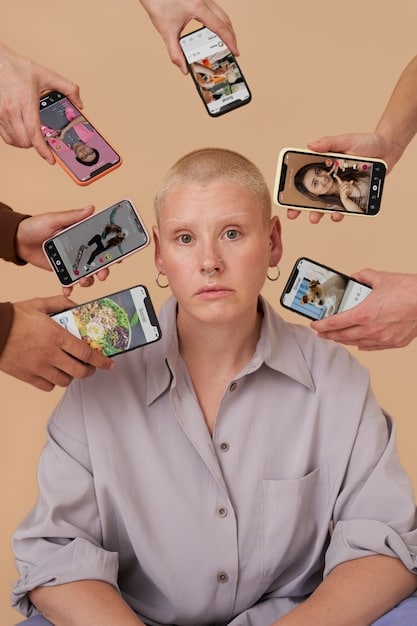The Impact of Social Media on US Entertainment: Building Star Brands

The Impact of Social Media on US Entertainment is profound, reshaping how stars cultivate their brands through direct engagement with fans, leading to increased influence and unprecedented monetization opportunities in the digital age.
The digital revolution has redefined how celebrities interact with their audience. Exploring the impact of social media on US entertainment: how are stars building their brands? is essential to understanding modern stardom.
The Rise of Social Media in US Entertainment
Social media’s ascent has fundamentally altered the landscape of US entertainment. Gone are the days when stars relied solely on traditional media outlets for exposure. Now, platforms like Instagram, Twitter, and TikTok offer a direct line to fans, enabling celebrities to craft their own narratives and build communities around their personal brands.
This shift has democratized the industry to some extent, allowing emerging talents to bypass traditional gatekeepers and directly showcase their abilities to a global audience. At the same time, it has placed new pressures on established stars, who must now constantly engage with their fans and manage their online reputations to stay relevant.

The Power of Direct Engagement
One of the most significant impacts of social media on US entertainment is the power of direct engagement it affords celebrities. Stars can now interact with their fans in real-time, responding to comments, answering questions, and participating in online discussions. This creates a sense of intimacy and connection that was previously impossible.
This direct engagement can be incredibly beneficial for building brand loyalty and fostering a strong fan base. Stars who are responsive and authentic on social media are often seen as more relatable and likable, which can translate into increased popularity and career opportunities.
- Authenticity: Stars can showcase their real personalities, building trust with fans.
- Responsiveness: Addressing comments and questions shows fans they are valued.
- Community Building: Creating spaces for fans to connect with each other.
Ultimately, the rise of social media has given celebrities unprecedented control over their own image and narrative. By mastering the art of direct engagement, stars can forge genuine connections with their fans and build lasting brands that transcend traditional notions of fame.
Building a Brand Through Social Media
Social media has become an indispensable tool for US entertainers seeking to build and maintain their brands. A carefully curated online presence can amplify a star’s reach, attract lucrative endorsement deals, and ultimately shape their public image. However, building a successful brand on social media requires a strategic approach and a deep understanding of the platform’s unique dynamics.
One of the key elements of building a brand through social media is consistency. Stars need to regularly post high-quality content that aligns with their brand values and resonates with their target audience. This content should be engaging, informative, and visually appealing, and it should be tailored to each platform’s specific format and audience.
Strategic Content Creation
Creating content that resonates with your target audience is crucial. This involves understanding trends, fan preferences, and the overall culture of each social media platform. Each post should be crafted with a clear purpose in mind, whether it’s to promote a new project, share a personal anecdote, or simply entertain followers.
Visual appeal is equally important. High-quality photos and videos are essential for capturing attention and conveying a sense of professionalism. Many stars invest in professional photographers and videographers to ensure that their content is visually stunning and consistent with their brand aesthetic.
- High-Quality Visuals: Professional photos and videos can enhance a star’s image.
- Consistent Posting: Regular updates keep fans engaged and build momentum.
- Platform-Specific Content: Tailoring content to each platform’s unique audience.
By focusing on strategic content creation, US entertainers can leverage social media to build strong, authentic brands that resonate with their fans and drive their careers forward.
The Impact on Traditional Media
The surge of social media has significantly impacted traditional media outlets, creating both challenges and opportunities for the US entertainment industry. As stars gain the capacity to communicate directly with their fan bases, the dependence on traditional media for publicity and image control lessens.
Traditional media, once the singular source of information and entertainment, now competes with social media platforms for audiences and relevance. This transition has forced traditional media outlets to adapt their strategies, often integrating social media content and formats into their programming to stay competitive.
Shifting Power Dynamics
The traditional media’s role as gatekeeper has diminished. Celebrities can bypass traditional publicity routes and communicate directly, influencing public perception and driving their own narratives. This shift empowers stars but also challenges traditional media to redefine its value.
Many traditional media outlets now use social media trends and content as sources for news and features. Viral videos, trending hashtags, and celebrity tweets often make their way into traditional news cycles, blurring the lines between user-generated content and professional journalism.

The relationship between social media and traditional media in US entertainment is complex and evolving. While social media has undoubtedly disrupted the old order, it has also created new avenues for collaboration and innovation. Ultimately, the industry’s success will depend on its ability to adapt to this changing landscape and harness the power of both traditional and social media to reach audiences and tell compelling stories.
Challenges and Pitfalls
While social media offers immense opportunities for US entertainers, it also presents a unique set of challenges and pitfalls. The constant pressure to maintain an online presence, the risk of public backlash, and the potential for privacy breaches are all factors that stars must carefully navigate to avoid damaging their brands.
One of the biggest challenges is maintaining authenticity while managing a carefully curated online image. Fans appreciate transparency and honesty, but stars must also be mindful of the potential consequences of sharing too much personal information or expressing controversial opinions.
Navigating Negativity
Dealing with negative comments, criticism, and online harassment is a common challenge. Stars must develop strategies for managing these situations while protecting their mental health and brand reputation. Ignoring the negativity, responding with humor, or taking more drastic measures like blocking or reporting users are all possible tactics.
Privacy is another major concern. Stars must be vigilant about protecting their personal information and guarding against hacking and identity theft. Sharing too much information about their location, travel plans, or personal relationships can make them vulnerable to stalkers and other threats.
- Privacy Concerns: Protecting personal information from hackers and stalkers.
- Authenticity Dilemma: Balancing transparency with the need to maintain a curated image.
- Online Harassment: Developing strategies for dealing with negativity and criticism.
By being aware of these challenges and proactively taking steps to mitigate them, US entertainers can navigate the complexities of social media and harness its power to build lasting brands and connect with their fans.
Monetization Strategies on Social Media
Social media platforms have not only revolutionized how US stars connect with fans but also how they monetize their influence. Various strategies, from sponsored content to affiliate marketing, enhance revenue streams and solidify their status as thriving entrepreneurs.
Sponsored content, arguably the most lucrative, involves stars promoting brands or products for a fee. The authenticity of these endorsements is critical; fans are more likely to trust and engage with promotions that align with the star’s brand and values.
Exploring Revenue Diversification
Many entertainers launch their own merchandise lines to generate revenue. Stars often sell apparel, accessories, and beauty products, capitalizing on their brand recognition and fan loyalty. Successful e-commerce operations need effective marketing and branding efforts.
Affiliate marketing is also common, where stars earn a commission for promoting other companies’ products. They share unique links or discount codes, and when followers make purchases through these links, the star earns a percentage of the sale.
- Sponsored Content: Revenue from promoting brands or products aligned with a star’s brand.
- Merchandise Lines: Sales of apparel, accessories, and beauty products under the star’s brand.
- Affiliate Marketing: Commissions earned from promoting other companies’ products through unique links.
Monetization on social media demands a balanced approach, harmonizing revenue generation with authenticity and fan engagement. US entertainers who successfully navigate this terrain can attain financial rewards while fortifying enduring connections with their audience.
Future Trends in Social Media and Entertainment
The confluence of social media and US entertainment is set to undergo more alterations. In the coming years, virtual reality (VR), augmented reality (AR), and artificial intelligence (AI) are poised to redefine celebrity-fan interactions and brand-building strategies.
VR and AR technologies offer immersive experiences, enabling stars to connect with fans in dynamic ways. From virtual meet-and-greets to interactive concerts in virtual environments, the potentials are extensive.
Anticipating the Next Digital Shift
Expect AI to play a more significant role in content creation and personalization. AI algorithms can analyze fan data to provide tailored content experiences, from personalized song recommendations to interactive stories where fans control the narrative.
Blockchain technology and Non-Fungible Tokens (NFTs) may also shape the future. Stars can offer unique digital collectibles, affording fans exclusive content and experiences. This could create new revenue streams while deepening connection with fans.
- VR/AR Integration: New immersive platforms will make experiences with celebrities feel more real.
- AI-Driven Personalization: Fans will get more tailored content thanks to smart algorithms.
- NFTs and Blockchain: Exclusive digital assets will offer a new way to build connections and boost income.
US entertainers must embrace these changes to remain ahead, utilizing cutting-edge technologies to enhance experiences, construct communities, and maintain influence in the evolving landscape of social media and entertainment.
| Key Aspect | Brief Description |
|---|---|
| 📣 Direct Engagement | Stars interact directly with fans, fostering intimacy. |
| 💡 Brand Building | Stars curate online presence to shape public image. |
| 💰 Monetization | Stars use sponsorships and merch to generate revenue. |
| 🔮 Future Trends | VR/AR and AI promise profound changes in interactions. |
Frequently Asked Questions
▼
Social media has democratized access, allowing stars to connect directly with fans, reducing reliance on traditional media for publicity and promotion activities.
▼
Platforms like Instagram, TikTok, and Twitter stand out due to their visual-driven content and large user base, making them essential for engaging with millions of people.
▼
Strategies include ignoring the negativity, responding with humor, blocking or reporting persistent harassment, and ensuring to prioritize mental health support.
▼
Stars use various methods: endorsements, creating their own merchandise, using affiliate marketing links, and developing membership tiers for exclusive interactions with followers.
▼
VR/AR integration, AI-driven personalized experiences, and blockchain technologies leveraging NFTs for community engagement and unique experiences are expected to rise soon.
Conclusion
The impact of social media on US entertainment has been nothing short of transformative. From empowering stars to connect directly with their fans to creating new avenues for monetization and brand building, the digital revolution has reshaped the industry in profound ways. As social media continues to evolve, it will be fascinating to see how US entertainers adapt and innovate to stay ahead of the curve.